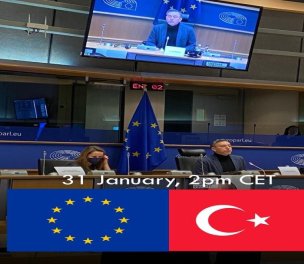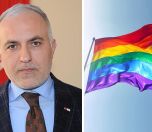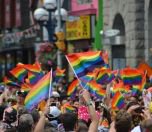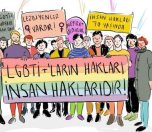*International Gathering Against Homophobia in Ankara, 2015
Click to read the article in Turkish
Most attacks on LGBTI+s occur in public spaces and are carried out by multiple perpetrators, a report by the Kaos Gay and Lesbian Cultural Research and Solidarity Association (Kaos GL) has revealed.
In more than two-thirds of the 150 reported cases, there were at least two perpetrators while 41 attacks were carried out by three or more people, according to the survey conducted via SurveyMonkey.
Also, 129 of the reported incidents occurred in public spaces such as schools, workplaces, streets, parks, hospitals and police stations.
In half of the cases, eyewitnesses do not react to the attack while they side with assailants in a quarter of the cases, the report says, noting that most of the reported incidents were in "lynch style."
"First of all, members of the dominant or majority group commit these crimes against LGBTI+s as a demonstration of strength. Even when there is only one individual targeted by the crime, they cooperate in these political crimes to 'give a message' to the entire LGBTI+ community and to reinforce their power on them," says the foreword of the report.
"Besides, while they are doing this as a mob, they 'share the responsibility of the crime,' in the words of Prof. Dr. Melek Göregenli. In a sense, they justify these acts, which are obviously crimes according to the penal code; moreover, they turn the crime into a punishment against LGBTI+ people."
Domestic violence
According to the report, 17 of the 150 attacks on LGTBI+s were carried out at home. Individuals who think that they can become targets anywhere deeply experience the feelings of "exclusion" and "insecurity," it says.
The strong anxiety that people who were subjected to a hate crime feel is intensified by the distrust against public agencies, especially law enforcement forces, which leads to very few numbers of hate crimes being reported to the police, the report further notes.
"The police are careless and deprecating"
Only 26 incidents out of 150 were reported to the police, the survey has found. The most common reasons for not reporting incidents were "not believing that the application will work," "to avoid being exposed to the family or media" and "not wanting to be subjected to discrimination by the police."
In nearly half of the reported incidents, the police were "careless" and in one-third, they "snubbed or deprecated" the applicants, the report says: "This finding indicates the origins of homophobia and transphobia based discrimination, which are institutionalized as well as social. In most cases, the police consider the criminals excusable people and the sufferers as those who deserved what happened."
The need for hate crimes legislation
Hate crimes do not only target individuals but also social groups that are not considered "acceptable" and pluralistic democracy, according to the report. "For this reason, only the regulations in the penal code or court verdicts are not enough; moreover, it is not possible to talk about effective legislation or jurisdiction regarding hate crimes against LGBTI+ people or other social segments."
"Then what to do? Of course, one of the first steps that need to be taken is to create hate crimes legislation and a political framework that takes OSCE standards as reference.
"In its current form, Article 122 of the Turkish Penal Code is far from meeting these standards. It is also not possible to talk about any other legal or political measure."
The method of the survey
The Kaos GL used the SurveyMonkey Pro application to conduct the survey. It used its daily updating news portal and social media to find sufferers and witnesses.
The questions were prepared in cooperation with ILGA Europe and considering the OSCE standards.
Answers were filtered according to reliability, completeness and consistency. Duplicate reports were also filtered. As a result, 150 cases are included in the report. In the previous year's report, the Kaos GL was able to find 62 cases. (EMK/VK)
Click for the full report (Turkish)










